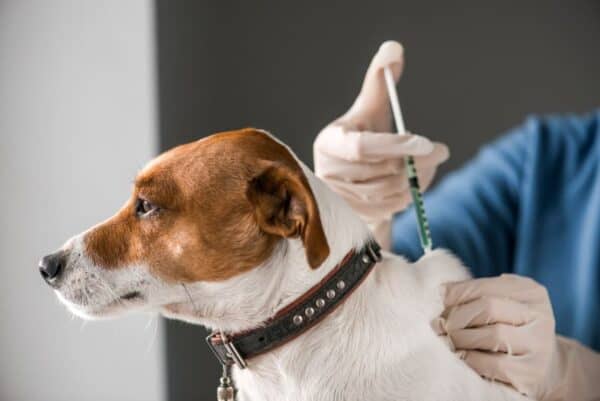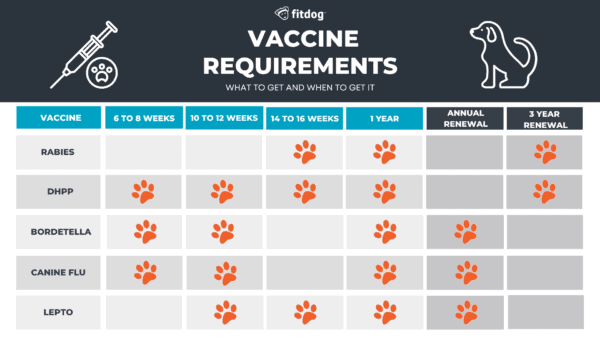Dog vaccines are not only a crucial component to disease prevention and safeguarding the community, but they also play a vital role in protecting our furry friends. If your dog regularly engages in group activities where large numbers of dogs interact, there is an increased risk of rapid spread of infection. That’s why maintaining a strict vaccine schedule becomes even more essential to ensure your dog’s well-being and the overall health of the canine community.
However, if you’re not apart of the pet care industry, you might question the necessity and purpose of dog vaccines. To offer a better understanding, let’s take a closer look at Fitdog’s required vaccines: Rabies, DAPP, Bordetella, Lepto, and Canine Flu.
Rabies
Rabies is a fatal viral infection of the brain and nerves, usually transmitted through bites from infected animals such as raccoons, skunks, foxes, and bats. It is a mandatory vaccine requirement in California. Often animals with rabies exhibit abnormal behavior, aggression towards humans or other animals, and excessive drooling. Read more about Rabies.
In California, the law requires that pet parents update their pet’s rabies vaccine every three years. Unfortunately, positive rabies titers cannot serve as a substitute, and no permanent exceptions are allowed.
DHPP/DAPP
The DHPP vaccine is a combination vaccine that protects dogs against Distemper, Adenovirus type 1 (Hepatitis), Adenovirus type 2 (respiratory), Parainfluenza, and Parvovirus. DHPP vaccine administration is required every 3 years.
- Distemper is a highly contagious viral illness affecting the respiratory, gastrointestinal, and central nervous systems of pups. Canine Distemper is spread through the air, direct contact, or contaminated objects. Symptoms include high fever, runny eyes/nose, coughing, loss of appetite, shaking, unsteadiness, and seizures. Early detection and treatment is needed to prevent permanent brain damage or death.
- Hepatitis Canine adenovirus-1 causes canine infectious hepatitis, a severe liver disease. Canine adenovirus-2 results in respiratory disease and usually links to cases of kennel cough.
- Parvovirus is a highly contagious virus that attacks the gastrointestinal tract and spreads through oral contact with infected feces. Dogs infected with this virus require immediate veterinary attention, especially puppies under one year of age. Signs of infection include vomiting, diarrhea, fever, decreased activity, and appetite. Early detection and aggressive treatment, often requiring hospitalization, offer the best chance for recovery.
- Parainfluenza This respiratory virus, not the same strain as the one affecting humans, only affects dogs. It spreads easily through contaminated objects or contact with infected dogs. Signs of infection in dogs include a long-lasting cough, runny nose, and a mild fever. In severe cases, the infection can progress to pneumonia.
Bordetella
Bordetella bronchiseptica, commonly known as kennel cough, is a highly contagious bacterium that primarily affects dogs, causing respiratory diseases. It is one of the most prevalent bacterial causes of kennel cough, a condition characterized by a dry, honking cough and a runny nose. This bacterium is easily transmitted through direct contact or the air and is known for its resistance to destruction in the environment. Therefore, it is crucial for dog owners to be aware of the potential risks and take necessary precautions to prevent the spread of this infectious disease. Read more about bordetella.
A vaccine booster is required every 6 to 12 months depending on veterinarian or daycare facility. Fitdog accepts any expiry date issued by a veterinarian.
Lepto
Lepto, short for leptospirosis, is a bacterial infection that is carried by a variety of wildlife including rats, raccoons, opossums, skunks, squirrels, and deer. This dangerous infection not only harms the kidneys and liver, but it can also have fatal consequences if left untreated.
Up until recently, Lepto was not considered a threat to dogs living west of the Mississippi River. However, in 2017, western states like Arizona began seeing cases. By late 2020, it had arrived in San Diego and by mid 2021 it had landed in Los Angeles. Outbreaks continue to persist, the most recent in Kansas City.
Since this disease is still threatening dogs and can be fatal, we highly recommend the vaccine for all dogs. It’s now mandatory for most doggy daycares in Los Angeles, including Fitdog, and pet parents need to update it every year.
Canine Flu
The Canine Flu is a relatively new disease impacting our dogs. Specifically, Canine H3N2 influenza was first identified in the U.S. in March 2015 following an outbreak of respiratory illness in dogs in the Chicago area. Los Angeles has seen outbreaks in 2016, 2017 and 2021. Fitdog began requiring the Canine Flu vaccine in November 2021. This vaccine needs to be updated annually.
It is a form of bronchitis and symptoms can resemble “kennel cough.” Canine Flu results in a persistent cough and dogs may also develop a thick nasal discharge and fever (often 104-105F). Other signs can include lethargy, eye discharge, and reduced appetite. Similar to humans, puppies and elderly dogs are impacted at a greater rate than healthy, adult dogs.
Immunization to common diseases is important for your dog’s health and the health of other dogs in the community. Dog vaccines typically need initial boosters and require updating every 1 to 3 years. Consult with your veterinarian with questions about your dog’s vaccines schedule.
Originally posted on February 11, 2016. Last updated on June 9, 2023.

